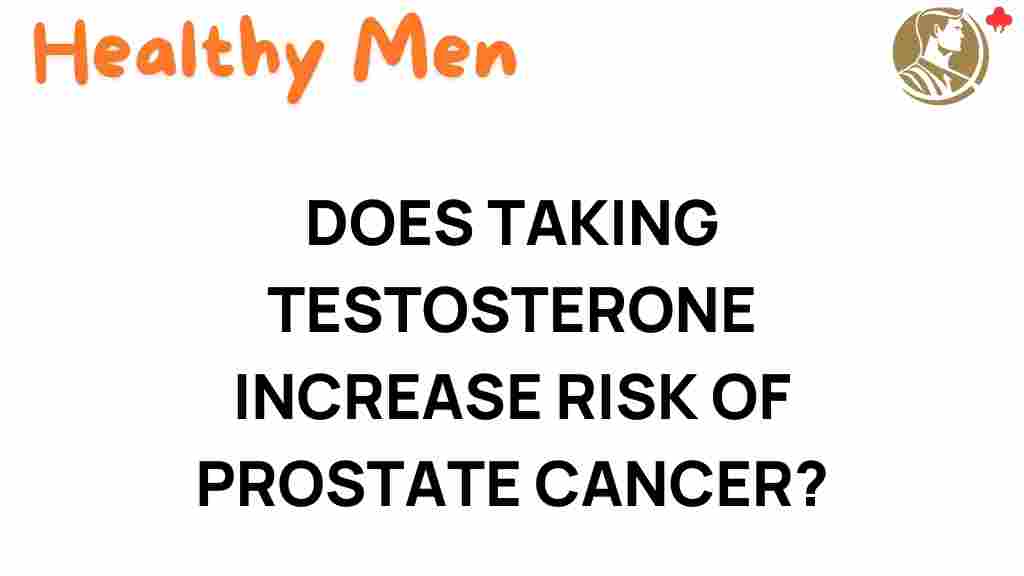Does Testosterone Elevate Prostate Cancer Risk? Unpacking the Controversy
Testosterone, a vital hormone for men’s health, has been at the center of a heated debate regarding its potential link to prostate cancer. With millions of men undergoing testosterone therapy to combat low testosterone levels, understanding the relationship between testosterone and prostate cancer is crucial. This article aims to unpack the controversy surrounding testosterone and its possible health risks, particularly concerning prostate cancer.
The Role of Testosterone in Men’s Health
Testosterone is primarily produced in the testicles and is responsible for the development of male characteristics. It plays a critical role in various physiological processes, including:
- Regulating libido (sex drive)
- Maintaining bone density
- Promoting muscle mass and strength
- Supporting mood and energy levels
However, testosterone levels naturally decline with age, leading many men to seek hormone therapy to restore their levels. While this therapy can improve quality of life, concerns about its safety, particularly in relation to prostate cancer, persist.
The Link Between Testosterone and Prostate Cancer
The relationship between testosterone and prostate cancer has been a subject of extensive cancer research. Some studies suggest that higher testosterone levels may increase the risk of prostate cancer, while others indicate no significant correlation. This inconsistency can be confusing for patients and healthcare providers alike.
Understanding Prostate Cancer
Prostate cancer is one of the most common cancers among men. It occurs when cells in the prostate gland grow uncontrollably. Risk factors for prostate cancer include:
- Age (risk increases after age 50)
- Family history of prostate cancer
- Ethnicity (higher risk in African American men)
- Obesity
Given these factors, the role of testosterone in prostate cancer development is critical to understand.
Current Medical Guidelines on Testosterone Therapy and Prostate Health
Medical guidelines regarding testosterone therapy and its association with prostate cancer have evolved over time. Key points include:
- **Testosterone therapy is generally considered safe in men without a history of prostate cancer.**
- **Regular screening for prostate cancer is recommended for men undergoing testosterone therapy.**
- **Physicians should evaluate the risks and benefits of testosterone therapy for each patient individually.**
According to the American Urological Association, there is no definitive evidence that testosterone therapy increases the risk of prostate cancer in men who are regularly monitored.
Recent Research Findings
Recent studies have shed light on the testosterone-prostate cancer relationship:
- Some research indicates that men with low testosterone may actually have a higher risk of developing prostate cancer.
- Other studies show that testosterone therapy does not increase the incidence of prostate cancer in men who do not have pre-existing conditions.
However, more research is necessary to draw conclusive links. The disparity in findings is partly due to differences in study designs, populations, and methodologies.
Clinical Perspectives from Urology Experts
Urology experts emphasize that the decision to start testosterone therapy should involve a comprehensive assessment of the patient’s overall health, including:
- Medical history
- Family history of prostate cancer
- Current health status
Additionally, ongoing monitoring of prostate-specific antigen (PSA) levels is essential for men receiving testosterone therapy. Elevated PSA levels may indicate prostate issues and require further investigation.
Step-by-Step Process for Safe Testosterone Therapy
For men considering testosterone therapy, the following steps can help ensure safety and efficacy:
- Consult a Healthcare Provider: Discuss symptoms, medical history, and potential risks associated with testosterone therapy.
- Get Tested: Have testosterone levels and PSA levels measured to establish a baseline.
- Discuss Treatment Options: Explore different forms of testosterone therapy (injections, gels, patches) and their implications.
- Regular Monitoring: Schedule routine follow-ups to monitor testosterone levels, PSA levels, and overall health.
- Adjust Therapy as Needed: Based on monitoring results, adjust testosterone therapy dosage or method if necessary.
Troubleshooting Potential Health Risks
While testosterone therapy can be beneficial, it’s important to be aware of potential health risks:
- **Increased Red Blood Cell Count:** Can lead to blood clots; regular blood tests are essential.
- **Sleep Apnea:** Some men may develop or worsen sleep apnea symptoms.
- **Prostate Health Issues:** Regular monitoring of PSA levels can help catch any abnormalities early.
If any concerning symptoms arise, such as difficulty urinating, blood in urine, or persistent back pain, consult your healthcare provider promptly.
The relationship between testosterone and prostate cancer remains complex and controversial. While testosterone therapy can significantly improve quality of life for men with low testosterone levels, ongoing research and medical guidelines emphasize the need for careful monitoring and individualized treatment plans.
Men considering testosterone therapy should engage in open discussions with their healthcare providers, weigh the benefits against potential risks, and stay informed about the latest cancer research and medical guidelines. Understanding the nuances of this relationship is vital for making informed decisions about men’s health and well-being.
For further information on prostate health and testosterone therapy, you can visit reputable sources like the National Cancer Institute.
This article is in the category Conditions and created by healthymen Team
